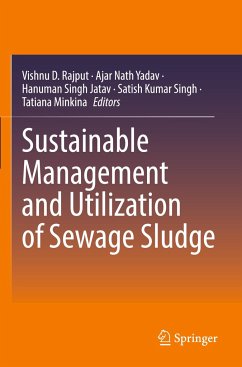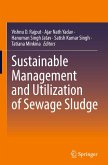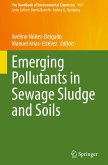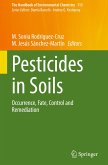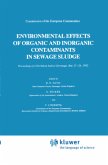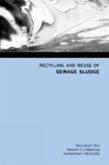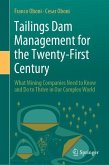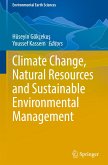Sustainable Management and Utilization of Sewage Sludge
Herausgegeben:Rajput, Vishnu D.; Yadav, Ajar Nath; Jatav, Hanuman Singh; Singh, Satish Kumar; Minkina, Tatiana
Sustainable Management and Utilization of Sewage Sludge
Herausgegeben:Rajput, Vishnu D.; Yadav, Ajar Nath; Jatav, Hanuman Singh; Singh, Satish Kumar; Minkina, Tatiana
- Broschiertes Buch
- Merkliste
- Auf die Merkliste
- Bewerten Bewerten
- Teilen
- Produkt teilen
- Produkterinnerung
- Produkterinnerung
This book is devoted to sewage sludge, its sustainable management, and its use and implications on soil fertility and crop production. The book traces the main chemical and biological properties of sewage sludge, and covers topics such as sewage sludge biostabilization and detoxification, biological and thermochemical treatment technologies, emerging nutrient recovery technologies, the role of microorganisms in sewage sludge management, and the sustainable use of sewage sludge as fertilizer in agriculture. The book offers a valuable asset for researchers, scholars and policymakers alike.
Andere Kunden interessierten sich auch für
![Sustainable Management and Utilization of Sewage Sludge Sustainable Management and Utilization of Sewage Sludge]() Sustainable Management and Utilization of Sewage Sludge139,99 €
Sustainable Management and Utilization of Sewage Sludge139,99 €![Emerging Pollutants in Sewage Sludge and Soils Emerging Pollutants in Sewage Sludge and Soils]() Emerging Pollutants in Sewage Sludge and Soils154,99 €
Emerging Pollutants in Sewage Sludge and Soils154,99 €![Pesticides in Soils Pesticides in Soils]() Pesticides in Soils262,99 €
Pesticides in Soils262,99 €![Environmental Effects of Organic and Inorganic Contaminants in Sewage Sludge Environmental Effects of Organic and Inorganic Contaminants in Sewage Sludge]() R.D. Davis / G. Hucker / P. L'Hermite (Hgg.)Environmental Effects of Organic and Inorganic Contaminants in Sewage Sludge121,99 €
R.D. Davis / G. Hucker / P. L'Hermite (Hgg.)Environmental Effects of Organic and Inorganic Contaminants in Sewage Sludge121,99 €![Recycling and Reuse of Sewage Sludge Recycling and Reuse of Sewage Sludge]() R K DhirRecycling and Reuse of Sewage Sludge141,99 €
R K DhirRecycling and Reuse of Sewage Sludge141,99 €![Tailings Dam Management for the Twenty-First Century Tailings Dam Management for the Twenty-First Century]() Franco OboniTailings Dam Management for the Twenty-First Century108,99 €
Franco OboniTailings Dam Management for the Twenty-First Century108,99 €![Climate Change, Natural Resources and Sustainable Environmental Management Climate Change, Natural Resources and Sustainable Environmental Management]() Climate Change, Natural Resources and Sustainable Environmental Management406,59 €
Climate Change, Natural Resources and Sustainable Environmental Management406,59 €-
-
-
This book is devoted to sewage sludge, its sustainable management, and its use and implications on soil fertility and crop production. The book traces the main chemical and biological properties of sewage sludge, and covers topics such as sewage sludge biostabilization and detoxification, biological and thermochemical treatment technologies, emerging nutrient recovery technologies, the role of microorganisms in sewage sludge management, and the sustainable use of sewage sludge as fertilizer in agriculture. The book offers a valuable asset for researchers, scholars and policymakers alike.
Produktdetails
- Produktdetails
- Verlag: Springer / Springer International Publishing / Springer, Berlin
- Artikelnr. des Verlages: 978-3-030-85228-3
- 1st edition 2022
- Seitenzahl: 444
- Erscheinungstermin: 19. Dezember 2022
- Englisch
- Abmessung: 235mm x 155mm x 24mm
- Gewicht: 668g
- ISBN-13: 9783030852283
- ISBN-10: 3030852288
- Artikelnr.: 66480662
- Herstellerkennzeichnung Die Herstellerinformationen sind derzeit nicht verfügbar.
- Verlag: Springer / Springer International Publishing / Springer, Berlin
- Artikelnr. des Verlages: 978-3-030-85228-3
- 1st edition 2022
- Seitenzahl: 444
- Erscheinungstermin: 19. Dezember 2022
- Englisch
- Abmessung: 235mm x 155mm x 24mm
- Gewicht: 668g
- ISBN-13: 9783030852283
- ISBN-10: 3030852288
- Artikelnr.: 66480662
- Herstellerkennzeichnung Die Herstellerinformationen sind derzeit nicht verfügbar.
Dr. Vishnu D Rajput earned degrees with good academic records in Agriculture and Biological Sciences: B.Sc. Ag, subsequently M.Sc. Ag from CS Azad University of Agriculture & Technology, India, Ph.D. from Chinese Academy of Sciences, China, and Post-doc from Southern Federal University, Russia. Presently, he is working as a Leading Researcher (Assoc. Prof.) at Sothern Federal University, Russia. His ongoing research is based on soil contaminations, i.e, potentially toxic elements, and metallic nanoparticles, and investigating the bioaccumulation, bio/geo-transformations, uptake, translocation, and toxic effects of metallic nanoparticles on plant physiology, morphology, anatomy, the ultrastructure of cellular and subcellular organelles, cytomorphomatric modifications, and DNA damage. He comprehensively detailed the state of research in environmental science in regard to "how nanoparticles/heavy metals interact with plants, soil, microbial community, and the larger environment.He has published (total of 168 scientific publications) 98 peer-reviewed highly rated full-length articles, 07 books, 20 chapters (Scopus indexed), conference articles. He is an internationally recognized reviewer (peer-reviewed more than 85 manuscript for internationally repute journals) and received an outstanding reviewing certificate by Elsevier & Springer. He is an editorial board member of Eurasian Journal of Soil Science (ISSN 2147-4249), SAINS TANAH - Journal of Soil Science and Agroclimatology (ISSN 1412-3606), Emergent Life Sciences Research (ISSN: 2395-6658) and serving as guest editor, Plants (ISSN 2223-7747, IF-2.76), and Frontiers in Agronomy (2673-3218). He received "certificate for appreciation 2019" "Certificate of Honor 2020" by Southern Federal University, Russia, for outstanding contribution in academic, creative research, and publication activities. He has also received the prestigious status "Highly Qualified Specialist" by SFedU and the Russian Ministry of Internal Affairs. Dr. Ajar Nath Yadav is an assistant professor (Senior Scale) in the Department of Biotechnology, Dr. Khem Singh Gill Akal College of Agriculture, Eternal University, Baru Sahib, Himachal Pradesh, India. He has 5 years of teaching and 11 years of research experiences in the field of microbial biotechnology, microbial diversity and plant-microbe-interactions. He obtained his doctorate degree in Science (Microbial Biotechnology), jointly from Indian Agricultural Research Institute, New Delhi and Birla Institute of Technology, Mesra, Ranchi, India. He has made pioneering contributions in the area ofmicrobial biotechnology, plant-microbes interaction and environmental microbiology. Dr. Yadav has 201 publications with h-index 46, i10-index 118, and 5551 citations (Google Scholar). Dr. Yadav is editors of 14 books in Springer, 2 books in Elsevier, and 5 books in CRC press, Taylor & Francis. Dr. Yadav has got 12 Best Paper Presentation Awards, and 01 Young Scientist Award (NASI-Swarna Jayanti Purskar). Dr. Yadav received "Outstanding Teacher Award" in 6th Annual Convocation 2018 by Eternal University, Baru Sahib, Himachal Pradesh. Dr. Yadav is currently handling two projects funded by DEST and HIMCOSTE. Presently he is guiding 05 Scholars for PhD degree. He has been serving as an editor/editorial board member and reviewer for different national and international peer-reviewed journals. He has lifetime membership of Association of Microbiologist in India, and Indian Science Congress Council, India. Hanuman Singh Jatav is an Assistant Professor in the Department of Soil science and Agriculture Chemistry, Sri Karan Narendra Agriculture University, Jobner Jaipur (Rajasthan) India. He has more than 3 years of teaching and 7 years of research experience in the field of Sewage Sludge, Biochar, Micronutrients, Heavy Metals Soil Fertility Management including M.Sc. (Ag.) and Ph.D. He has completed B.Sc.(Ag.) Maharana Pratap University of Agriculture and Technology, Udaipur-Rajasthan, India and further he also completed his M.Sc. in Soil Science and Agriculture Chemistry from, Institute of Agricultural Sciences, Banaras Hindu University, Varanasi- U.P. India. He submitted his doctorate from Banaras Hindu University, Varanasi- U.P. India. At present, he is an emerging person in the field of research transforming himself to an excellent scientific level by enhancing research capacity by promoting environmental sustainability. He has published more than 60 Research papers, Review papers, Book chapters and Technical papers in various national and international repute journals. He is serving as an academic editor and member of subject expertise in Springer, Taylor and Francis, Elsevier, CARJ, JEB, Science Domain, Frontiers for the last three years. He is serving as an active member of more than 10 various national and international societies. He is also awarded by best paper and poster presentation for his work. He has also attended more than 25 conferences besides this he has also completed more than 20 training pertaining to his research. Dr. Satish Kumar Singh is a former Head and currently working as Professor in Department of Soil Science & Agricurtural Chemistry, Institute of Agricultural Sciences, Banaras Hindu University, Varanasi, India. He has more than 30 Years of experience in the field of Agriculture in Teaching /Research /Extension. His area of specialization is Micronutrients Nutrition and Heavy Metals Pollution. He has completed his Ph.D. in the year 1992 from Banaras Hindu University. He is focusing his research work on Sewage Sludge management/ utilization in agriculture particularly in rice-wheat system. He has guided 25 M.Sc. (Ag) and 7 Ph.D students. He is Fellow of Indian Society of Soil Science, New Delhi and Fellow of Indian Society of Agricultural Chemists, Allahabad. He has been involved in processof designing the curriculum and member of board of study of several universities. He is the editor of the Journal of Indian Society of Soil Science and Agropedology. He has been the Organizing Secretary of the conference and Course Director and Course Coordinator of the Refresher course of UGC and ICAR .He has 9 books,10 book chapters and 115 peer reviewed publications to his credit in National and International Journals of the repute. Prof. Dr. Tatiana Minkina is the Head of Soil science and land evaluation department of Southern federal university. The Head of International Master's Degree Educational Program "Management and estimation of land resources" (2015-2022 years, accreditation by ACQUIN). The area of scientific interest is Soil Science, Biogeochemistry of Trace Elements, Environmental Soil Chemistry. Soil monitoring, assessment, modeling and remediation using physicochemical treatment methods. Awarded in 2015 with Diploma of the Ministry of Education andScience of the Russian Federation for many years of long-term work for development and improvement of the educational process, significant contribution to the training of highly qualified specialists. ¿urrently, she is handling projects funded by Russian Scientific foundation, Ministry of Education and Science of the Russian Federation, Russian foundation of Basic Researches. Member of Expert Group of Russian Academy of Science; the International Committee on Contamination Land; Eurasian Soil Science Societies; the International Committee on Protection of the Environment; the International Scientific Committee of the International Conferences on Biogeochemistry of Trace Elements. Total scientific publications: 757 (total 957, 389 in English); Scopus - 216, WoS - 141, scientific publications and citing index: Scopus - 1543, h-index - 20; WoS - 803, h-index - 16.. The invited editor of an Open Access Journal by MDPI "Water", ISSN 2073-4441 (Impact factor: 2.524). Editorial board memberof Geochemistry: Environment, Exploration, Analysis; ISSN: 1467-7873 (Impact factor: 1.109; 5yr IF: 1.769; SJR: 0.334; SNIP: 0.598) and Eurasian Journal of Soil Science; e-ISSN: 2147 - 4249.
Sewage Sludge Management for Environmental Sustainability: An Introduction.- Sewage Sludge Management: Analytical Methods.- Bioleaching Approach for Enhancing Sewage Sludge Dewaterability.- Potential Role of Beneficial Microbes for Sustainable Treatment of Sewage Sludge and Wastewater.- Biological and thermo-chemical treatment technologies for sustainable sludge management.- Emerging Nutrient Recovery Technologies in Sewage Sludge Management.- Biostabilization of Sewage Sludge.- Sewage Sludge Treatment and involvement of microbes.- Role of Beneficial Microbes in Sewage Sludge Management.- Sewage Sludge and Its Health Risk Assessment: Opportunities and Challenges.- Scope of Antibiotic Resistance Genes in Sewages Sludge for Therapeutic Uses.- Required Quality of Sewage Sludge as an Agricultural Soil Amendment.- Detoxification of Sewage Sludge by Natural Attenuation and Application as A Fertilizers.- Socio Economic Aspects of Sewage Sludge Use in Agriculture.- Sustainable use of sewage sludge in soil fertility and crop production.- Municipal Waste Management: Current Research and Future Challenges.- Management of Sewage Sludge for Environmental Sustainability.- Global Scenario of Sewage Sludge Management.- Biological and Thermo-Chemical Treatment Technologies for Sustainable Sludge Management.
Sewage Sludge Management for Environmental Sustainability: An Introduction.- Sewage Sludge Management: Analytical Methods.- Bioleaching Approach for Enhancing Sewage Sludge Dewaterability.- Potential Role of Beneficial Microbes for Sustainable Treatment of Sewage Sludge and Wastewater.- Biological and thermo-chemical treatment technologies for sustainable sludge management.- Emerging Nutrient Recovery Technologies in Sewage Sludge Management.- Biostabilization of Sewage Sludge.- Sewage Sludge Treatment and involvement of microbes.- Role of Beneficial Microbes in Sewage Sludge Management.- Sewage Sludge and Its Health Risk Assessment: Opportunities and Challenges.- Scope of Antibiotic Resistance Genes in Sewages Sludge for Therapeutic Uses.- Required Quality of Sewage Sludge as an Agricultural Soil Amendment.- Detoxification of Sewage Sludge by Natural Attenuation and Application as A Fertilizers.- Socio Economic Aspects of Sewage Sludge Use in Agriculture.- Sustainable use of sewage sludge in soil fertility and crop production.- Municipal Waste Management: Current Research and Future Challenges.- Management of Sewage Sludge for Environmental Sustainability.- Global Scenario of Sewage Sludge Management.- Biological and Thermo-Chemical Treatment Technologies for Sustainable Sludge Management.

